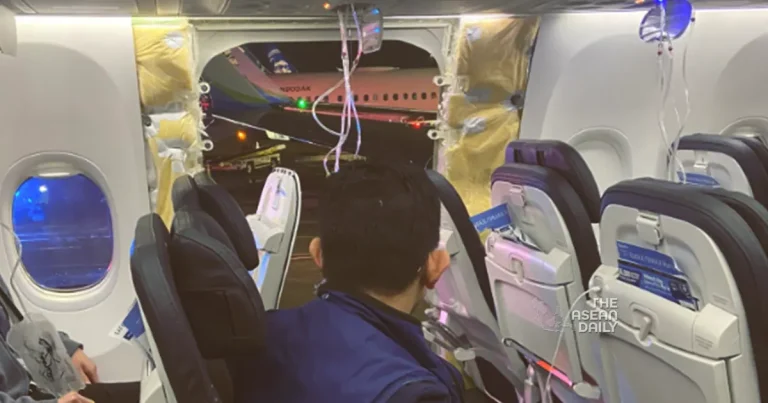7-2-2024 (WASHINGTON) US investigators have revealed that four bolts, which should have prevented a panel from detaching, were apparently missing from an Alaska Airlines jet that experienced an incident at 16,000 feet. The preliminary report from the National Transportation Safety Board (NTSB) indicates that the bolts were removed during work at Boeing’s Renton factory in Washington and were not replaced. This finding has intensified scrutiny of Boeing’s ability to ensure the safety of its aircraft.
The incident has become Boeing’s largest crisis since its entire fleet of Max jets was grounded worldwide in 2019 following two fatal crashes. Max 9 jets with a similar configuration to the Alaska plane were also grounded for several weeks until inspections could be carried out. Regulators are now closely examining Boeing’s manufacturing processes and increasing pressure on the company’s management.
While the report does not reach a conclusion on the cause of the January 5 accident, it provides a detailed account of the initial fact-gathering by the safety board. The independent agency typically takes a year or longer to reach a formal conclusion.
Melius Research analyst Rob Spingarn commented that the findings point to “a breakdown in the quality management system within Boeing’s four walls.” Boeing has stated that it will review the report and continue to cooperate with US investigators. CEO Dave Calhoun acknowledged Boeing’s accountability for the incident and emphasized the implementation of a comprehensive plan to strengthen quality and regain stakeholders’ confidence.
Last month, the US Federal Aviation Administration (FAA) blocked Boeing from increasing production of the 737 Max as the agency reviews the company’s quality practices. On Tuesday, key supplier Spirit AeroSystems Holdings Inc., responsible for building the 737 fuselages, refrained from issuing full-year guidance due to uncertainty over Boeing’s production rate.
Following the incident, Boeing’s shares rose 0.9% on Tuesday, but the stock has fallen by 20% since the beginning of the year. Meanwhile, Spirit Aero’s shares gained 5%, reducing its slump in 2024 to about 12%.
The NTSB report reveals that the 737 Max 9 airframe arrived at Boeing’s Renton facility on August 31 and was flagged for having five damaged rivets along the side of the door plug, where the failure subsequently occurred. To replace the rivets, mechanics had to remove the door plug and four retaining bolts. According to a report by Spirit Aero personnel on September 19, the rivets were replaced. However, a photo obtained by NTSB investigators showed that the door plug was missing retention bolts in at least three places. The photo was shared by Boeing employees before work on the plane’s interior. The NTSB noted that the holes where the retention bolts should have been installed showed no evidence of heavy contact damage, suggesting that the bolts were not present when the panel blew open on the Alaska Airlines jet shortly after takeoff from Portland last month. The plane experienced a violent loss of pressure and had to make an emergency landing, resulting in minor injuries to seven passengers and a flight attendant.
Bloomberg reported last month that Boeing used two different record-keeping systems to track work on 737s, which led to confusion at the Renton factory. The NTSB report stated that the investigation is ongoing to determine which manufacturing documents were used to authorize the opening and closing of the failed panel.
Melius’ Spingarn pointed out that the report raises questions about why the plug was seemingly not re-inspected to ensure that the bolts were in place after it was removed and re-installed. He stated, “In this instance, we seem to have multiple points of failure in that the bolts were not reinstalled, and then that mistake was not caught and corrected before the aircraft left the factory.”
The FAA is conducting enhanced oversight of Boeing and Spirit. FAA Administrator Michael Whitaker informed lawmakers on Tuesday that the agency’s reviews are still ongoing but have not yet identified anything requiring immediate action. Initial findings may be released later this month.
Boeing continues to encounter issues related to its work on the Max family of aircraft. On February 4, the company disclosed manufacturing flaws with rivet holes in approximately 50 undelivered 737s. The problem originated with Spirit, according to a spokesman for the supplier. This is the latest in a series of glitches stemming from Boeing’s former aerostructures unit. A drilling mishap on an aft pressure bulkhead supplied by Spirit Aero disrupted deliveries of the 737 Max last year, while a separate issue with tail-fin fittings affected output earlier in 2023.
Representative Rick Larsen of Washington state, the highest-ranking Democrat on the Transportation and Infrastructure Committee, stated that the NTSB report demonstrates that “Boeing has serious work to do to rebuild its safety culture and the confidence of its customers and the flying public.” Senator Maria Cantwell, the Washington Democrat who chairs the Commerce Committee, announced plans to hold hearings on the issues raised by the NTSB.




